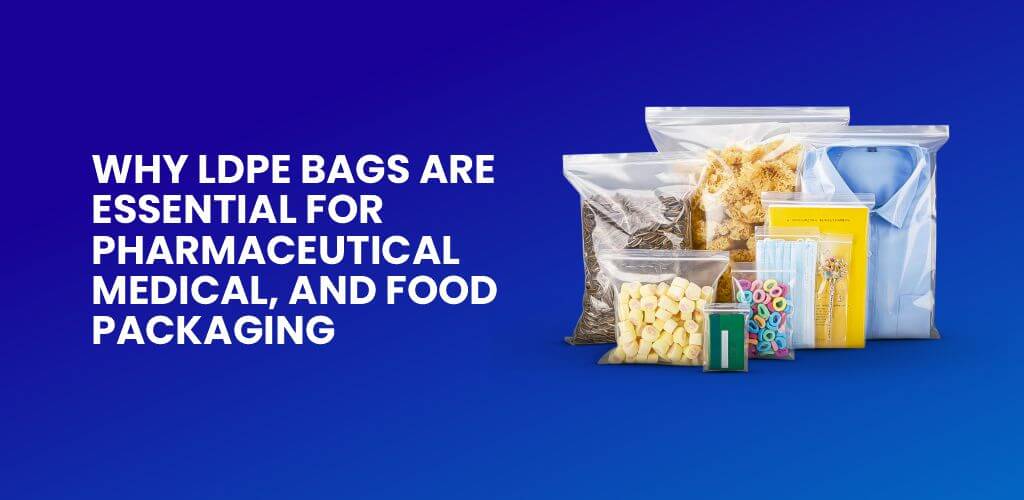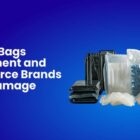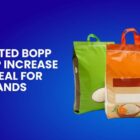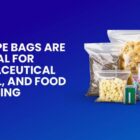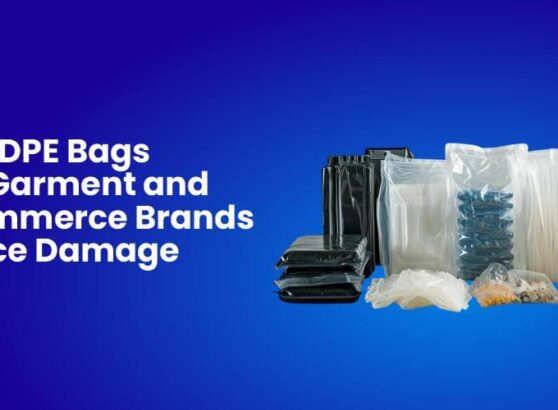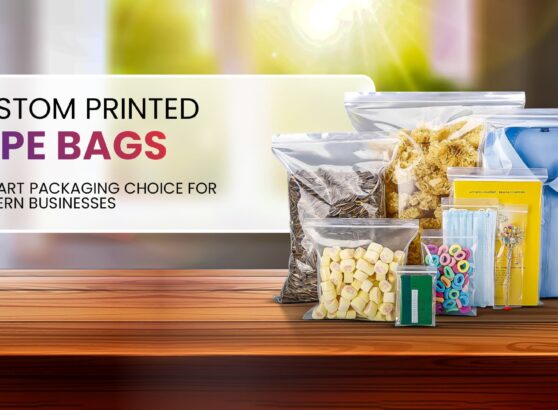Behind every securely sealed medicine, sterilized medical instrument, or fresh food product is packaging that quietly does its job—keeping contents safe, clean, and intact. Among the many materials used in the industry, LDPE (Low-Density Polyethylene) bags have proven to be indispensable.
LDPE bags are lightweight, flexible, and highly resistant to chemicals and moisture, making them ideal for sensitive applications. From pharmaceutical manufacturers to food processors and hospitals, industries rely on LDPE packaging to maintain hygiene, extend shelf life, and meet strict regulatory standards.
This article explains why LDPE bags have become the material of choice for pharmaceutical, medical, and food packaging, what makes them so effective, and how leading manufacturers like Rilei Pack are helping businesses maintain safety and compliance through advanced packaging solutions.
Understanding LDPE Bags: What Makes Them Unique
LDPE (Low-Density Polyethylene) is a thermoplastic made from the polymerization of ethylene under high pressure. Its molecular structure gives it a soft, flexible, and transparent quality that sets it apart from other plastics like HDPE or polypropylene.
Key Properties of LDPE
- Flexibility: LDPE is more elastic than other plastics, making it ideal for sealing and wrapping applications.
- Chemical Resistance: It doesn’t react with most acids, alcohols, or detergents—crucial for pharmaceutical and medical packaging.
- Moisture Barrier: LDPE bags provide an effective barrier against water and vapor, protecting sensitive products from contamination.
- Transparency: The material’s clarity allows for easy inspection of contents, essential in medical and food packaging lines.
- Recyclability: LDPE can be recycled into new packaging materials or industrial films, contributing to sustainability goals.
Because of these features, LDPE bags are not only practical but also cost-effective for large-scale production and long-term storage needs.
LDPE Bags in the Pharmaceutical Industry
Pharmaceutical packaging requires materials that meet high standards of purity, durability, and safety. Every medicine—from tablets to injectables—must be protected from contamination, light, and moisture. LDPE bags play a vital role in this environment.
How LDPE Ensures Drug Safety
- Moisture Protection: Medications are sensitive to humidity. LDPE’s low moisture permeability helps maintain product stability during storage and transport.
- Chemical Neutrality: LDPE does not leach harmful chemicals or react with the substances it contains, ensuring drug integrity.
- Sterilization Compatibility: LDPE bags can be sterilized using gamma irradiation or ethylene oxide, allowing use in sterile packaging environments.
- Tamper Evidence: LDPE bags can be heat-sealed or equipped with tear notches and security seals to prevent tampering.
Common Pharmaceutical Applications
- Primary Packaging: For bulk powders, tablets, and capsules before bottling or blistering.
- Secondary Packaging: For sealed bottles, vials, or blister packs during shipping.
- Sterile Product Storage: For syringes, IV sets, and diagnostic kits.
Pharmaceutical companies trust LDPE for its reliability and compliance with global standards such as the FDA, the EU, and ISO 11607 for medical packaging systems.
LDPE Bags in the Medical Sector
The medical field depends heavily on packaging that maintains sterility and protects against contamination. Whether used in hospitals, clinics, or laboratories, LDPE bags ensure that medical tools and disposables remain safe and ready for use.
Why LDPE Is Ideal for Medical Packaging
- Sterile Storage: LDPE bags can be used to store instruments after sterilization without compromising integrity.
- Barrier Protection: They guard against dust, bacteria, and moisture—critical for maintaining hygiene.
- Customizable Thickness and Size: From thin liners to heavy-duty specimen bags, LDPE can be tailored to specific medical applications.
- Safe Disposal: LDPE medical waste bags are puncture-resistant and compatible with biohazard labeling for safe disposal.
Common Medical Uses
- Specimen Collection Bags: Used for transporting biological samples safely.
- Sterile Instrument Covers: Keep tools protected from contamination before procedures.
- Biohazard Waste Bags: Clearly marked LDPE bags for the collection and disposal of infectious waste.
- Protective Overwraps: Used as secondary protection for sterile pouches or trays.
LDPE’s clean, non-toxic nature and sealing strength make it the go-to choice for hospitals and healthcare suppliers worldwide.
LDPE Bags in Food Packaging
Food safety is a non-negotiable part of the packaging process. LDPE bags are extensively used in the food industry because they offer a strong barrier against moisture, air, and contaminants without affecting food flavor or quality.
Benefits of LDPE in Food Applications
- Hygienic and Non-Toxic: LDPE is approved for direct food contact under FDA and EU regulations.
- Extended Shelf Life: Its moisture barrier prevents food spoilage and bacterial growth.
- Odor and Taste Neutral: LDPE doesn’t impart any smell or flavor, keeping food fresh.
- Clarity for Presentation: Transparent LDPE bags allow customers and quality inspectors to see the product clearly.
Common Food Packaging Uses
- Frozen and Refrigerated Foods: Ideal for packaging frozen vegetables, meats, and bakery products.
- Dry Goods: Widely used for rice, pulses, and grains.
- Prepared Meals: LDPE films are used as liners or vacuum pouches to retain freshness.
- Snack Packaging: Often used as inner liners for multi-layer pouches due to their sealing strength.
Whether used for industrial-scale food production or retail-ready products, LDPE bags combine practicality with hygiene—two things every food manufacturer depends on.
Compliance and Safety Standards: Meeting Industry Regulations
For pharmaceutical, medical, and food industries, compliance isn’t optional—it’s a necessity. Packaging materials must meet strict safety standards to prevent contamination and ensure traceability. LDPE packaging easily fits within these regulatory frameworks.
Key Regulatory Standards for LDPE Bags
- FDA (Food and Drug Administration): Approves LDPE for food and pharmaceutical contact.
- EU Food Contact Regulation (EU 10/2011): Ensures materials don’t release harmful substances.
- ISO 11607: Sets packaging standards for terminally sterilized medical devices.
- GMP (Good Manufacturing Practice): Requires clean production environments and traceable materials.
Manufacturers like Rilei Pack adhere to these standards by maintaining quality control systems, using virgin-grade LDPE resins, and conducting regular product testing. This ensures each bag meets safety and performance benchmarks required by global industries.
Sustainability and Recycling: LDPE’s Environmental Edge
While plastic often gets criticized for its environmental impact, LDPE has made strides in sustainability. Advances in recycling and reprocessing have made LDPE one of the more eco-efficient plastic options available.
How LDPE Supports Sustainability
- Recyclable Material: LDPE can be collected and reprocessed into new films, garbage liners, or industrial products.
- Lightweight Efficiency: Less material is needed to achieve strength, reducing transportation emissions.
- Energy-Efficient Production: LDPE manufacturing requires less energy compared to alternatives like PVC.
- Reduced Waste through Reuse: Many LDPE bags are reusable in non-sterile applications, such as storage or transport.
Leading manufacturers, including Rilei Pack, are developing eco-friendly LDPE formulations that use recycled content or bio-based resins while maintaining the same protective qualities. This innovation is helping industries transition toward greener packaging practices without compromising quality.
Customization and Advanced LDPE Solutions
Modern industries demand packaging that’s not only safe but also tailored to specific needs. LDPE bags can be customized in size, thickness, color, print, and functionality to match product requirements.
Custom Features Offered by Manufacturers
- Thickness Range: From 20 microns for lightweight applications to 200 microns for heavy-duty use.
- Printing Options: Company logos, handling instructions, or compliance markings can be added.
- Antistatic and UV Additives: For sensitive electronics or sunlight exposure.
- Zip Lock and Resealable Closures: To preserve freshness and allow repeated use.
- Vent Holes or Gusseted Designs: For breathable packaging or bulk items.
By offering tailored solutions, Rilei Pack helps pharmaceutical, medical, and food businesses achieve higher efficiency and brand consistency. Whether it’s a sterile pouch or a bulk food liner, customized LDPE bags streamline logistics and enhance presentation.
Choosing the Right LDPE Bag Manufacturer
Selecting a reliable packaging partner is just as important as choosing the right material. Companies should look for manufacturers with proven quality systems, customization capabilities, and global compliance certifications.
What to Look For
- Experience in Regulated Industries: Proven track record with pharmaceutical and food packaging clients.
- Clean Manufacturing Environment: Facilities that follow GMP and ISO-certified practices.
- Material Traceability: Use of virgin LDPE with documentation of resin origin.
- Testing and Certification: Regular testing for tensile strength, barrier performance, and chemical safety.
- Timely Delivery and Bulk Supply Capacity: Consistent supply for large production schedules.
As a leading LDPE bag manufacturer, Rilei Pack combines advanced production technology with strict quality control, ensuring every bag meets the highest standards for hygiene, safety, and performance. Their customer-focused approach makes them a trusted name for businesses looking for dependable packaging partners.
Conclusion: LDPE Bags—Safe, Smart, and Sustainable Packaging for Modern Industries
In pharmaceutical, medical, and food sectors, packaging isn’t just a protective layer—it’s part of the product’s integrity. LDPE bags stand out for their ability to safeguard against contamination, maintain product stability, and meet global safety regulations.
From sterile surgical tools to fresh food and life-saving medications, LDPE packaging ensures that what reaches the end user is exactly as intended: safe, clean, and uncompromised.
Manufacturers like Rilei Pack continue to refine LDPE bag production through innovation, sustainability, and strict adherence to standards. For companies seeking reliable packaging that meets modern demands, LDPE bags remain an essential choice—a balance of practicality, performance, and protection.
Looking for high-quality LDPE bags for pharmaceutical, medical, or food applications?
Get in touch with Rilei Pack today to discuss customized packaging solutions that meet your safety and quality needs.

